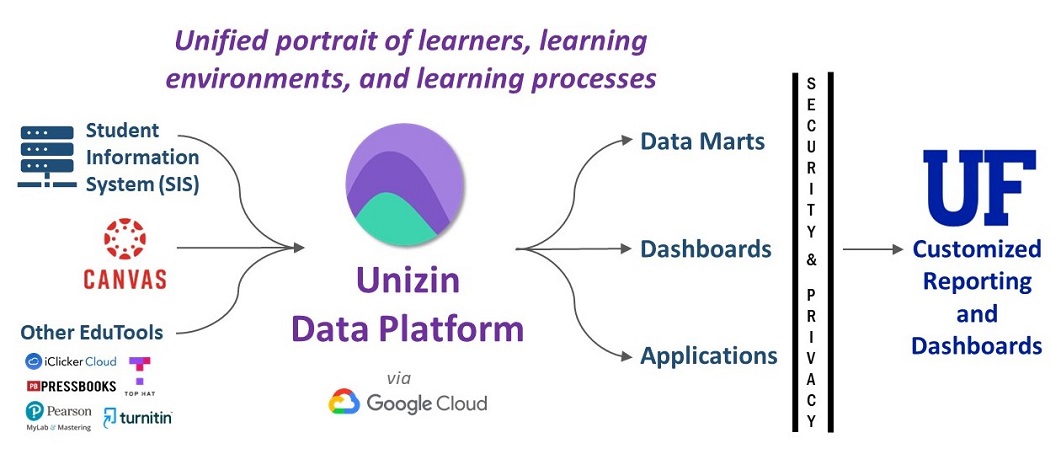Unizin Enabled Research
The Unizin Data Platform (UDP) collates data from its member institutions and makes this cloud-native data available for educational research applications. Utilizing UDP data provides access to the world’s first unified institutional-level data platform that aggregates, cleans, models and stores all teaching and learning data, from multiple learning sources as well as the Student Information System (see figure below). Bringing together this context and behavior data required the use of two interoperability standards in this pioneering service: an industry standard, the 1EdTech (formerly IMS Global) Caliper framework, and a unique solution, the Unizin Common Data Model.

Additionally, the Unizin consortium enables institutional members to benefit from vendor partnerships and each other's work. Institutional members of Unizin can develop custom applications using the UDP, such as with My Learning Analytics (MyLA) designed by the University of Michigan, and then easily share the product with other members. We are also leveraging their vendor relationships to pilot and adopt innovative commercial educational technologies (e.g., Gradescope).
Leveraging the UDP
The Learning Analytics team of UFIT CITT provides support for gaining access to the UDP and analyzing education-related data. Support services include liaison assistance for direct access or delivery of a curated data set, research design consultations or collaborations, and data analysis for actionable insights.
Data sets from the UDP can be classified by the UF Institutional Review Board (IRB) as non-human subject data and PIs can use their Automated Determination Tool. This determination is based on the fact that the data was already collected via Canvas, but it is contingent on the use of non-identifiable data. Our team can facilitate non-traceable user identification numbers (similar to a UFID) and the confidentiality agreement paperwork for the response “No: data/specimens are coded but someone not on the research team has the code.” To begin this process, the PI should submit a UFIT CITT Learning Analytics ticket. We will help determine the availability of the desired data and provide a more detailed overview of the process. If the PI is not the instructor or record, the instructor of record will need to be contacted to provide permission for their course data to be analyzed.
A self-paced bootcamp from Unizin Data Services and Solutions is available to guide members in exploring and writing code against datasets within their institutional, GCP production space at their own pace. It includes videos, exercises, and best practice examples that provide a foundation for analytics and actionable insights using learner and learning environment data from their institution. Access requires the UF_N_UNIZIN_DATA_CONTEXT_READ role from your DSA and approval from the Data Steward (submit a UFIT CITT Learning Analytics ticket for more information and to get started).
Research Project Examples
Predictive Analytics
Led by Dr. Jose Silva-Lugo, the goal of this project is to develop models for predicting students at risk of not passing a course so a weekly warning system can be implemented, alongside additional resource recommendations to better support the struggling students. The project involves a specific training set of historic UF semester data in the UDP, then testing various models and procedures for accuracy with other data-mined samples. This work is challenging, in a good way, by the highly unbalanced UF student performance data of around 94% passing and only 6% failing. You can read more about our work in the case study “Navigating Severe Imbalanced Class Issues in Predicting Students ‘At Risk’ Using Cross-Industry Standard Process for Data Mining” within Sage Research Methods: Data and Research Literacy.
MyLA Pilot
My Learning Analytics (MyLA), developed by the University of Michigan, is an interactive, student-facing dashboard designed to support the self-regulated learning process. Once enabled by the instructor, the different data visualizations allow students to set learning goals and to monitor progression towards those goals as well as view their activities and performance relative to their peers.
To support UFIT’s 2020-2025 strategic goals of advancing an analytics-enabled environment and enabling student success, a MyLA pilot study was conducted in Fall 2022, led by Dr. Heather Maness. Over 3,400 students in 27 courses had access; about one-third used the tool (similar to UMich), generating >9k sessions. The majority of student respondents favored wider adoption—finding MyLA helpful for planning their course activity, studying, and boosting their confidence that they understood the material. Despite multiple announcements, students who did not use MyLA cited lack of awareness or forgetfulness, underscoring the need for robust communication efforts.
In Fall 2025, we will launch a new survey to compare student experiences in MyLA with similar Canvas features like class-wide assignment score details and the What-If score (available in Grades) as well as the newly enabled Course Analytics for students. This latest work is supported by a Unizin Academic Research Stipend.
Gradescope Pilot
Gradescope an AI -assisted online grading software to help efficiently grade paper-based style homework and exams as well as coding assignments. Initially piloted in Fall 2022 with the Department of Computer & Information Science & Engineering and growing to 47 courses in 7 Colleges, the pilot successfully led to a three-year institutional contract. Gradescope integrates with Canvas for gradebook sync and offers features like automated grouping of similar responses, dynamic rubrics, regrade workflows, and detailed analytics to support instructional decisions. An example of the positive instructor feedback received was, “I really enjoyed it! There is a learning curve and an upfront [time] cost to building the rubric, but the grading process is much more efficient and fair for all students.”
